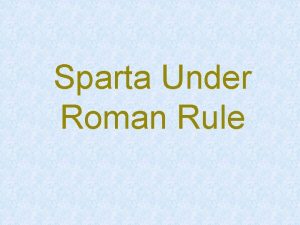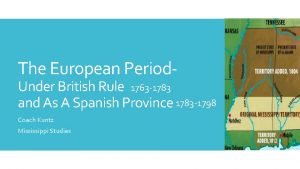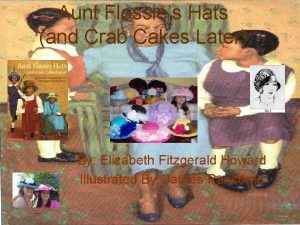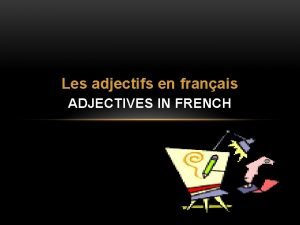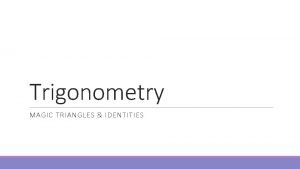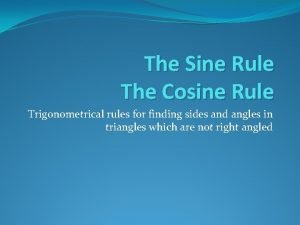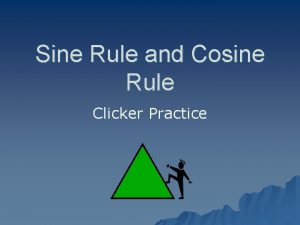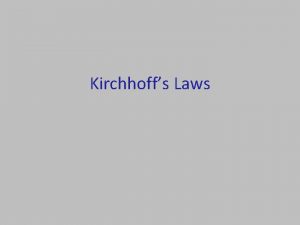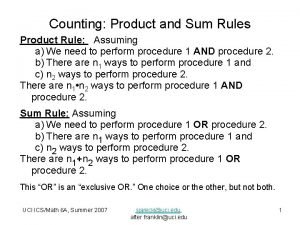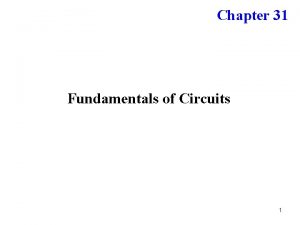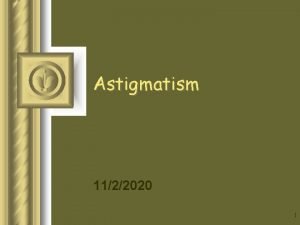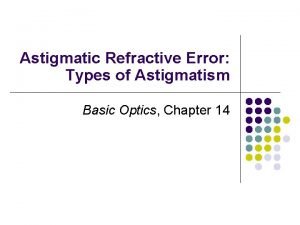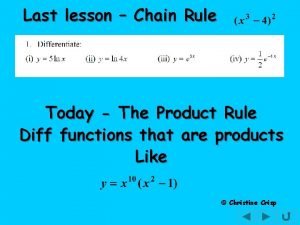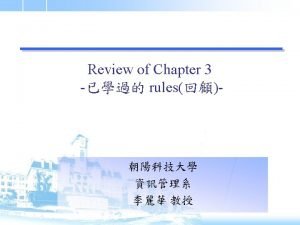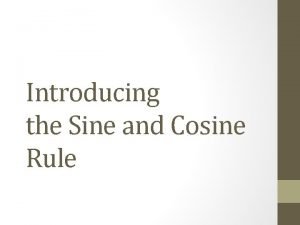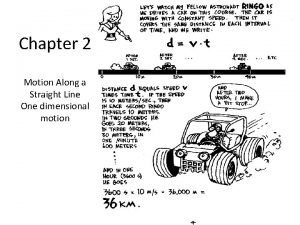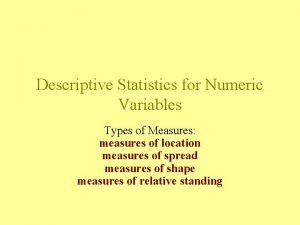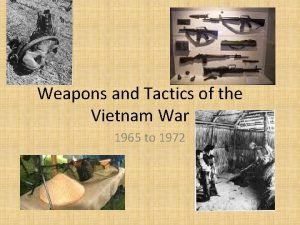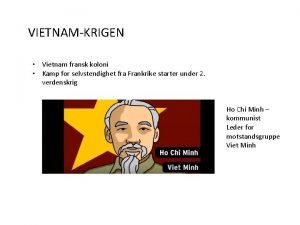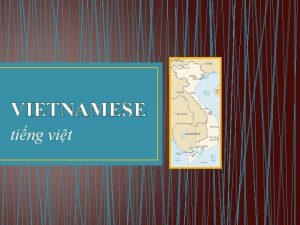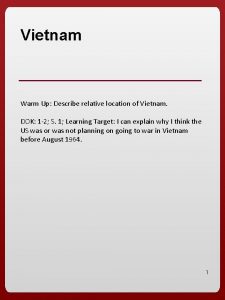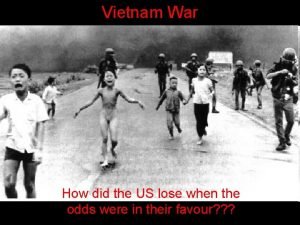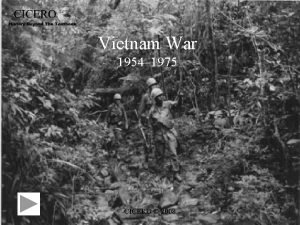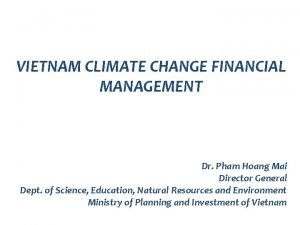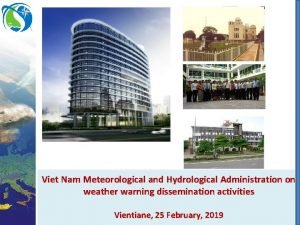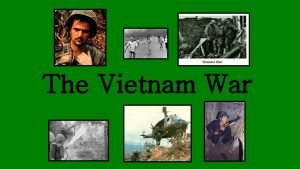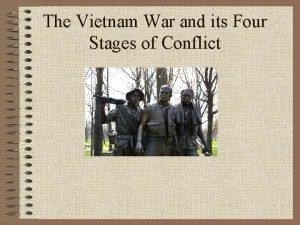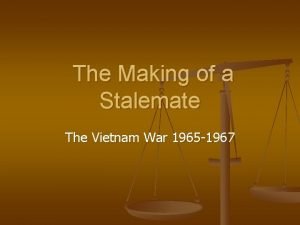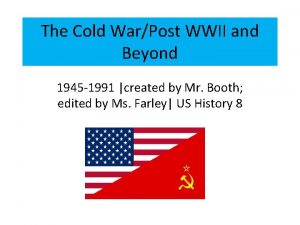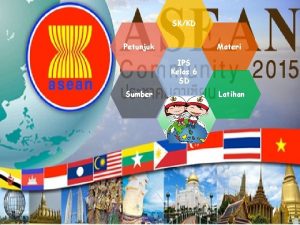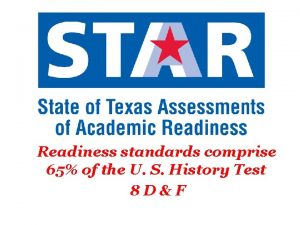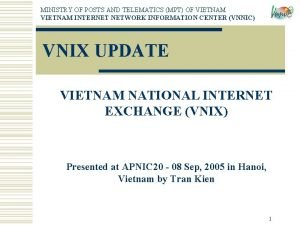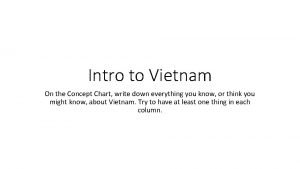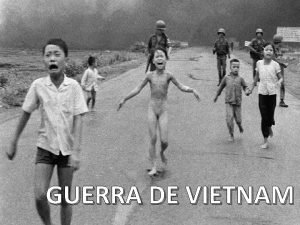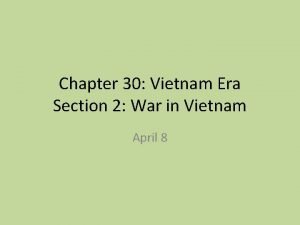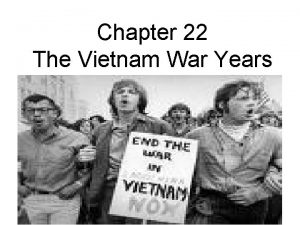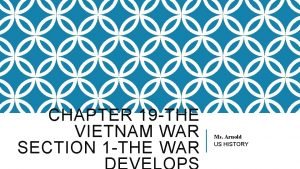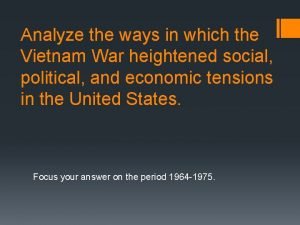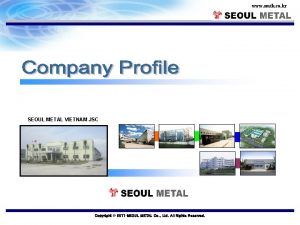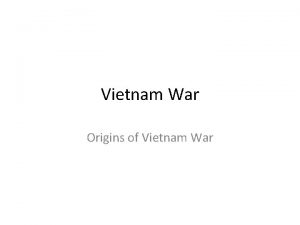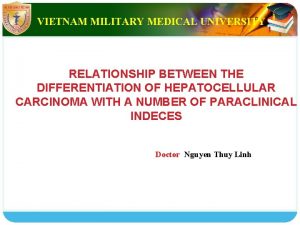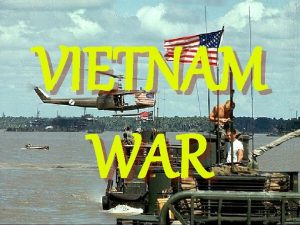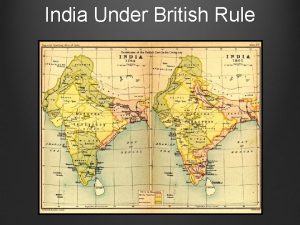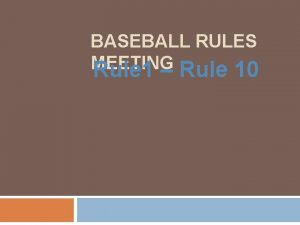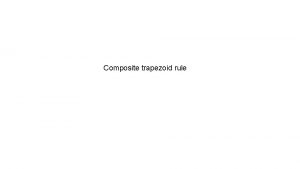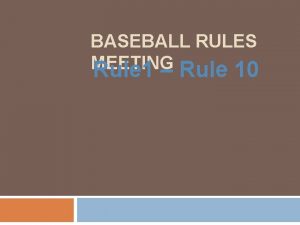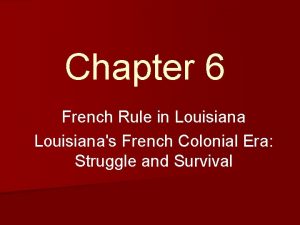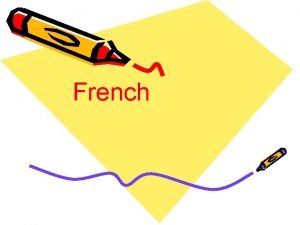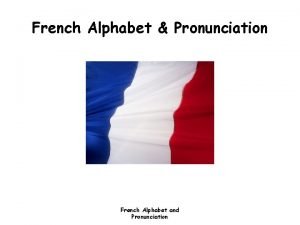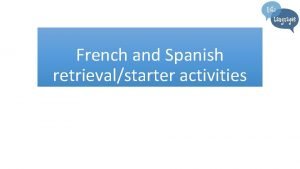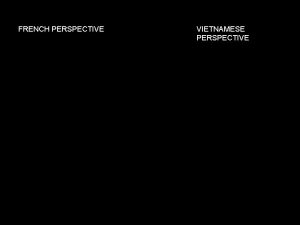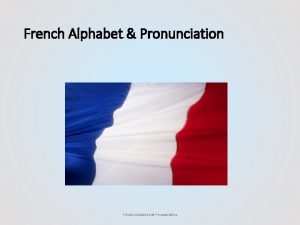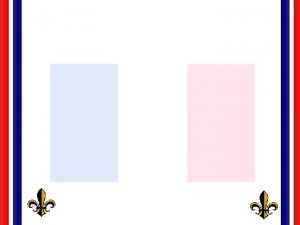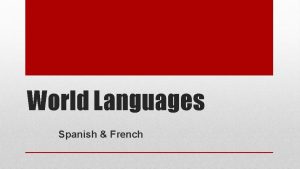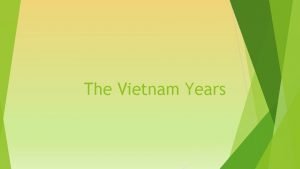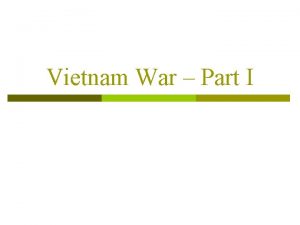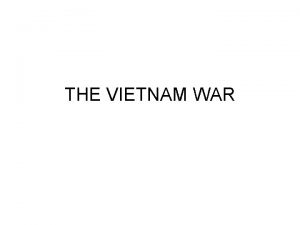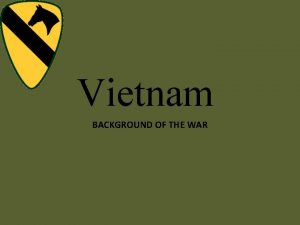Vietnam Vietnam under french rule Vietnam is a














































- Slides: 46

Vietnam




Vietnam under french rule Vietnam is a small country in Southeast Asia. Vietnam had been part of a French colony called Indochina. The people of Vietnam wanted their independence. ◦ Ho Chi Minh led the fight REMEMBER, after World War II many colonies in Africa and Asia fought for their independence. (Vietnam and France are an example. )

From 1945 to 1954, Ho led the Vietminh in a war against the French. ◦ Vietnamese Communists In 1954, Vietnam defeated the French and became independent. INDEPENDENCE

Vietnam was divided at the 17 th parallel. ◦ Ho Chi Minh became the leader of a Communist government in NORTH VIETNAM ◦ SOUTH VIETNAM was ruled by a Dictator that was strongly disliked. Ngo Dinh Diem ◦ He was dishonest and corrupt. War Begins Geneva Accords

Diem is out


In 1956 the North Vietnamese wanted to hold elections so people could vote to unite Vietnam under one government. ◦ South Vietnam’s dictator refused to have elections. ◦ In order to unite all of Vietnam, Communists in the North sent weapons and additional soldiers to help the Viet Cong-------- Communists living in the South. LOST CAUSE Under the Geneva Accords, elections would be held to unite the country within a few years

Many poor farmers in the South joined the Viet Cong because they were angry with South Vietnam’s government, which did not help the nation’s poor people. The Vietnam War began in 1957 when the Viet Cong revolted against South Vietnam’s government. ◦ The Vietnam War began as struggle between Communists and non-Communists for control of South Vietnam The struggle Starts as a civil war (north v. south)

The United States Becomes Involved with Vietnam President Eisenhower agreed with the Truman Doctrine of containing communism. ◦ Eisenhower sent money and weapons to South Vietnam. Dwight Eisenhower

Under President Kennedy the U. S. continued Eisenhower’s policies. ◦ The U. S. sent greater amounts of weapons and money to South Vietnam as well as military advisors. John F. Kennedy

Under President Johnson’s term the North Vietnamese sent soldiers into the South to win control of the country. ◦ Johnson did not want to be known as the President who lost South Vietnam to Communism. ◦ In August 1964, President Johnson said North Vietnam’s ships had attacked two American ships in the Gulf of Tonkin. Lyndon B. Johnson

The gulf of tonkin Congress quickly passed the Gulf of Tonkin Resolution, which gave Johnson the power to go to war against North Vietnam. ◦ “… Congress approves and supports the determination of the President…to take all necessary measures to repel any armed attack against the forces of the United States and to prevent further aggression. ” Congress never declared war as the Constitution requires.

◦ Johnson began to escalate America’s war effort in 1964 by bombing NV (North Vietnamese) supply routes. ◦ In 1965 the first American soldiers and marines were sent to fight in the South. 1965 - 200, 000 1968 - 500, 000 ◦ The American Air Force dropped more bombs during the Vietnam War than it had dropped in WWII. ◦ WOW!!!!!!!!!!!!!!! President Johnson and the Vietnam war


Agent orange Helicopters were important in the Vietnam War, they were used during “search and destroy” missions. ◦ Americans in helicopters searched for Viet Cong soldiers who were hiding in villages, jungles, and mountains. ◦ Then the Americans destroyed their hiding place. Americans used a chemical called Agent Orange to destroy plants and trees in jungles and on mountains, so the Viet Cong had fewer places to hide. Effects of expose: Cancer, unspeakable deformities


Early in January 1968, American were told they were winning the war in Vietnam. January 30, 1968, the North Vietnamese army and the Viet Cong began to attack cities throughout South Vietnam. ◦ The attacks took place during the Tet holiday (New Year). ◦ It was clear that many people in South Vietnam supported the Communists. ◦ Many Americans began to believe that the United States would not be able to defeat the Communists in Vietnam. The TEt offensive



The Communists fought the Americans using “guerilla warfare”. ◦ Hit and run tactics ◦ Soldiers do not wear uniforms or fight openly The climate and environment gave soldiers great difficulty. It was extremely difficult to identify which people in the village were Viet Cong soldiers. Guerrilla war



Peace talks begin In March, 1968, President Johnson announced that he would start peace talks with North Vietnamese leaders to end the war. Ho Chi Minh

The protest movement People who supported the war were called “hawks”. After the Tet Offensive, large numbers of Americans became “doves”. ◦ People who wanted to end the Vietnam War. Thousands of men resisted being drafted into the military. Some moved to Canada in order to avoid serving in Vietnam. Others claimed to be conscientious objectors. It was painful for American soldiers to fight a war that many Americans did not support.

◦ In 1968, Richard Nixon becomes President. ◦ President Nixon had a plan to end the Vietnam War “peace with honor” ◦ Nixon began a program called Vietnamization. ◦ Its goal---- to train South Vietnamese soldiers to fight the Communists by themselves. As the SV army grew stronger, the American army started a withdrawal. ◦ The policy failed!! Power was given to the corrupt (weak) government. President nixon and the vietnam war



In April, 1970, President Nixon ordered the air force to bomb Vietnam’s western neighbor, Cambodia. ◦ The Viet Cong had weapons and bases in Cambodia that they used for attacking South Vietnam. Many Americans were outraged at Nixon’s order to expand the war. Cambodia Now what?

SILENT MAJORITY

Major protests at home were a result of Nixon’s bombing of Cambodia. Kent State University had one of the worst riots. ◦ Students destroyed property to show their anger about the war. ◦ The National Guard was called to stop the riots. ◦ Four students were shot to death as the National Guard tried to end the riots. Protests and violence


In 1969, President Nixon had sent Henry Kissinger, his security adviser, to lead secret peace talks with North Vietnam. Kissinger years. negotiated secretly with NV leaders for several ◦ In 1973, a cease-fire agreement was signed in Paris. The agreement required all American forces to leave Vietnam in two months. The warring nations agreed to return all prisoners of war, or POWs. The end of the vietnam war

In December, 1970, Congress repealed the Gulf of Tonkin Resolution. ◦ The President no longer had full power to fight a war in Vietnam. After many Americans left, North Vietnamese soldiers invaded the South in 1972. ◦ Nixon tried to stop the invasion by bombing North Vietnam. The United States was unsuccessful in the attempted halt of NV troops. Congress takes actions

The South Vietnamese Army could not stop the Viet Cong and NV forces. ◦ South Vietnamese soldiers and civilians were forced to retreat. ◦ During this retreat many SV soldiers and civilians were killed. This tragic event became known as the Convoy of Tears. Convoy of tears

When NV troops got close to Saigon (SV Capital) in April 1975, the U. S. sent helicopters to help 1, 000 U. S. workers and 5, 500 SV supporters leave the country. U. S. ships rescued thousands of Vietnamese who fled on boats. The war continues


The Vietnam War became the first war the United States lost. Three million Americans served in war and 58, 000 died. The war cost $150 billion. 4, 000 American soldiers never returned home after the prisoner exchange. ◦ Since there was NO proof that they were dead, they were listed as “missing ◦ WHY? ◦ The huge amount of money spent on the war hurt the American economy for years. in action, ” or MIA. Veterans, who lacked support when they got home, also suffered. The war changed the United States. ◦ The nation moved closer to its old policy of isolationism. Results of the vietnam war


More than 350, 000 South Vietnamese died in combat, while a million NV died. Bombing tore apart North Vietnam. In South Vietnam, 10 million people lost their homes. Over 200, 000 boat people died while trying to escape RED Vietnam. Costs of war for vietnam

America’s faith in its government grew weaker. ◦ Secret government documents, known as the Pentagon Papers, were published in 1971. These papers detailed U. S. involvement in Vietnam and revealed that U. S. leaders had misled Americans about the war. In 1973, Congress passed a law called the War Powers Act. ◦ This act limited a President’s power to make war. disappointment

An important lesson Americans learned important lessons from the war in Vietnam. ◦ The domino theory was wrong. ◦ A united country is a MUST.

A memorial to honor those men and women who died in Vietnam. ◦ It is located in Washington D. C. ◦ It has two long, black walls with names of more than 58, 000 soldiers who died in the war. ◦ It also has the names of those soldiers still missing in action. Designed by Maya Lin, a Chinese. American. The vietnam veterans memorial

 Sparta under roman rule
Sparta under roman rule Under british rule, 1763-1783
Under british rule, 1763-1783 In french in french
In french in french Beaux adjectifs
Beaux adjectifs Special angles triangles
Special angles triangles Sine rule cosine rule
Sine rule cosine rule Cosine rule bbc
Cosine rule bbc The junction rule
The junction rule Product rule for counting
Product rule for counting Dillon rule
Dillon rule Kirchhoff's loop rule example
Kirchhoff's loop rule example With the rule astigmatism
With the rule astigmatism Bioblique astigmatism
Bioblique astigmatism Astigmatism classification
Astigmatism classification When do you use the product rule
When do you use the product rule General power rule
General power rule Sine rule cosine rule
Sine rule cosine rule Chain rule power rule
Chain rule power rule Leptokurtotic
Leptokurtotic Us weapons vietnam war
Us weapons vietnam war Vietnam fransk koloni
Vietnam fransk koloni Language vietnamese
Language vietnamese Vietnam relative location
Vietnam relative location Korean war vietnam war venn diagram
Korean war vietnam war venn diagram Vietnam 1954
Vietnam 1954 Climate of vietnam
Climate of vietnam Vietnam meteorological and hydrological administration
Vietnam meteorological and hydrological administration What was the result of the vietnam war
What was the result of the vietnam war Stages of the vietnam war
Stages of the vietnam war Did the vietnam war end in a stalemate
Did the vietnam war end in a stalemate Civil war digging deeper webquest answers
Civil war digging deeper webquest answers The things they carried tongue necklace
The things they carried tongue necklace Kd ips kelas 6 semester 1
Kd ips kelas 6 semester 1 Vietnam draft lottery
Vietnam draft lottery Rencontres du vietnam
Rencontres du vietnam Mpt vietnam
Mpt vietnam Landforms of vietnam
Landforms of vietnam Causas de vietnam
Causas de vietnam Truman doctrine and marshall plan venn diagram
Truman doctrine and marshall plan venn diagram Causes of vietnam war
Causes of vietnam war The domino theory vietnam war
The domino theory vietnam war Chapter 19 the vietnam war
Chapter 19 the vietnam war Analyze the ways in which the vietnam war heightened social
Analyze the ways in which the vietnam war heightened social Seoul metal vietnam
Seoul metal vietnam Where is vietnam
Where is vietnam The vietnam war
The vietnam war Vietnam military medical university
Vietnam military medical university
